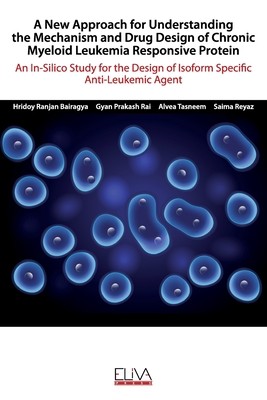
- We will send in 10–14 business days.
- Author: Gyan Prakash Rai
- Publisher: Eliva Press
- ISBN-10: 1952751519
- ISBN-13: 9781952751516
- Format: 15.2 x 22.9 x 0.3 cm, softcover
- Language: English
- SAVE -10% with code: EXTRA
A New Approach for Understanding the Mechanism and Drug Design of Chronic Myeloid Leukemia Responsive Protein (e-book) (used book) | bookbook.eu
Reviews
Description
Chronic myeloid leukemia (CML) is a blood cancer. In CML cancer, stem cells of bone marrow form abnormal WBCs that hinder the function of normal RBCs and WBCs. CML occurs due to a chromosomal translocation between BCR gene on Chromosome-22 and ABL gene on Chromosome-9. The purine nucleotide biosynthesis pathway consists of three enzymes (hIMPDH, hGMPS and hGMPR) which are identified to be responsible for CML cancer and they are also involved in cellular metabolic pathways that exhibit elevated levels of activity in rapidly proliferating cells, such as neoplastic and regenerating tissues. These CML responsive proteins exist as type-I and II isoforms. Isoform-II is responsible for CML cancer, whereas isoform-I which keeps a housekeeping role, and observed in normal cells. Our in-silico methods may explore some new biochemical mechanism and novel conformation of this protein that may be effective for future drug discovery. The basic problem for discovery of drugs for CML cancer protein is that all proposed inhibitors bind to CML cancerous and normal protein, as a result both normal and cancer cells lose their function and die. To design the drugs for CML cancerous protein, isoform specific (type-II) drug design techniques were employed in this study and the new inhibitors were identified by computational method using different databases. The computationally designed proposed drugs can be effective to recognize the CML cancer protein and may act as a good drug candidate for CML cancer.
EXTRA 10 % discount with code: EXTRA
The promotion ends in 19d.09:50:39
The discount code is valid when purchasing from 10 €. Discounts do not stack.
- Author: Gyan Prakash Rai
- Publisher: Eliva Press
- ISBN-10: 1952751519
- ISBN-13: 9781952751516
- Format: 15.2 x 22.9 x 0.3 cm, softcover
- Language: English English
Chronic myeloid leukemia (CML) is a blood cancer. In CML cancer, stem cells of bone marrow form abnormal WBCs that hinder the function of normal RBCs and WBCs. CML occurs due to a chromosomal translocation between BCR gene on Chromosome-22 and ABL gene on Chromosome-9. The purine nucleotide biosynthesis pathway consists of three enzymes (hIMPDH, hGMPS and hGMPR) which are identified to be responsible for CML cancer and they are also involved in cellular metabolic pathways that exhibit elevated levels of activity in rapidly proliferating cells, such as neoplastic and regenerating tissues. These CML responsive proteins exist as type-I and II isoforms. Isoform-II is responsible for CML cancer, whereas isoform-I which keeps a housekeeping role, and observed in normal cells. Our in-silico methods may explore some new biochemical mechanism and novel conformation of this protein that may be effective for future drug discovery. The basic problem for discovery of drugs for CML cancer protein is that all proposed inhibitors bind to CML cancerous and normal protein, as a result both normal and cancer cells lose their function and die. To design the drugs for CML cancerous protein, isoform specific (type-II) drug design techniques were employed in this study and the new inhibitors were identified by computational method using different databases. The computationally designed proposed drugs can be effective to recognize the CML cancer protein and may act as a good drug candidate for CML cancer.


Reviews